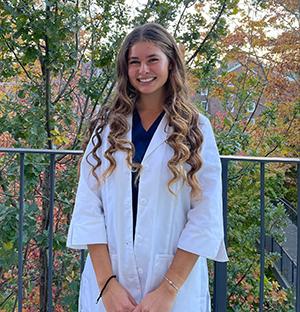Embodying the Art of Caring

UNH Nursing Student Lauren Ogonowsky
Lauren Ogonowsky’s decision to pursue the UNH nursing program wasn’t just a career choice; it was also a calling inspired by personal experience.
Ogonowsky's uncle had lost his life to a rare disorder, and the experience of being in acute health care settings opened her eyes to the importance of patient care.
“Watching the nurses interact with him sparked my interest,” she says. “I think it’s great to provide comfort to someone at their most vulnerable times.”
A Passion for Patient Care at UNH
Ogonowsky chose the nursing program at UNH in part for its affiliation with organizations that are committed to providing and valuing compassionate care, such as the Watson Caring Science Institute (WCSI), a non-profit organization that advances the philosophies, theories, and practices of human caring and caring science.
“UNH focuses a lot on caring science and blending the art of caring and the science of nursing,” Ogonowsky says. “I really value that, and I will carry it with me post-graduation.”
Building A Career in Nursing
Ogonowsky has spent the last year working as a certified nursing assistant in the intensive care and cardiovascular intensive care units at Cape Cod Hospital. She also completed her senior practicum in the emergency department at Portsmouth Regional Hospital.
Most recently, Ogonowsky and a team of UNH nursing students worked with Sullivan County Health Care (SCHC) on a public health project to replace random roommate assignments at nursing homes with more personalized ones. Their goal is to help facilitate a more comfortable and homely environment as SCHC transitions to its newly constructed facilities in 2025.
“There isn't a lot of literature about this specific tool or roommate pairings for nursing home residents, mostly because no one has really made a transition moving all the residents to a brand-new facility before,” Ogonowsky says.
“The hope is that future students can collaborate with computer science majors to create a database that matches residents based on compatibility,” Ogonowsky says. “On a larger scale, if research into this was published or had funding behind it, there’s an opportunity to build it out. I’m interested to see where it goes.”
Following graduation, Ogonowsky will work at Beth Israel Deaconess Medical Center in Boston as a nurse in the surgical intensive care unit as part of their nurse residency program. She hopes to continue to pursue a career as a critical care nurse.
“Nurses in the ICU often manage one or two patients and can engage deeply with each patient. This allows them to think critically about complex and dynamic cases,” she says. “This presents an opportunity for nurses to be very empathetic and ensure that that person is as comfortable as possible.”